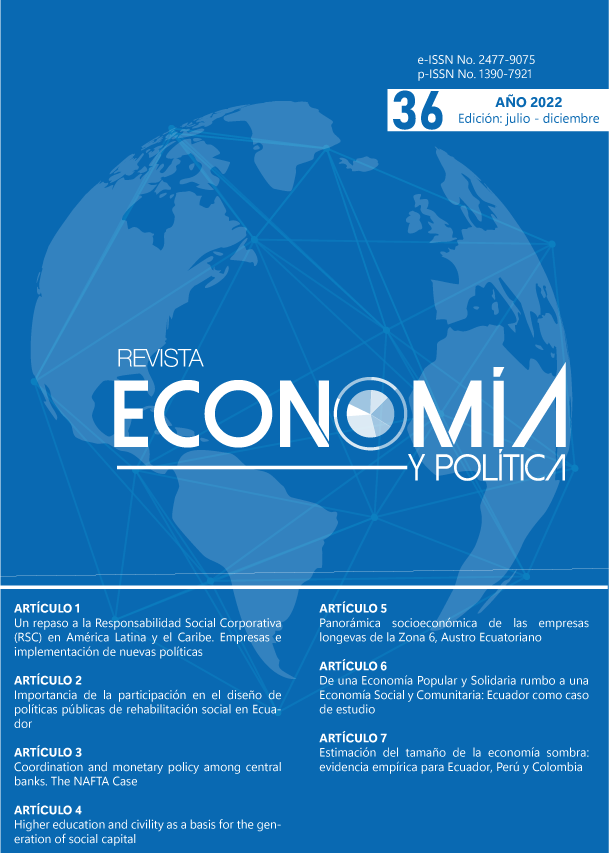Higher education and civility as a basis for the generation of social capital
Case study ECCI University Bogotá Colombia
DOI:
https://doi.org/10.25097/rep.n36.2022.04Keywords:
Associativity, civility, trust, development, higher education.Abstract
The current Colombian context requires the strengthening of the social fabric from strengthening trust and associativity in citizens against institutions, a need that is generated as part of the strategic transformation of the country, which demands quality education to reduce inequality. And strengthen trust in society. Descriptive research is developed with a quantitative analysis from a sample of (423) students from the ECCI University. Confidence is assumed as a linking axis with higher education and the basis of civility, the present study starts by recognizing that universities have the responsibility to generate and develop the potential of their students as citizens, strengthening the responsibility in the face of social change in their lives and their environment in a social state of law, in this sense, higher education institutions must promote the generation of networks and citizen participation.
Downloads
References
Adler, P. & Seok-W. 2002. “Social Capital: Prospects for a New Concept.” The Academy of Management Review 27(17–40). DOI: https://doi.org/10.2307/4134367.
Atria, R., Siles M., Arriagada I., Robinson, L., and Acott Whiteford. 2003. Capital Social y Reducción de La Pobreza En América Latina y El Caribe: En Busca de Un Nuevo Paradigma. Naciones Unidas.
Brands, E., 2018. “Shifting the Perspective on Community-Based Management of Education: From Systems Theory to Social Capital and Community Empowerment.” International Journal of Educational Development 64(17–26). DOI: https://doi.org/10.1016/j.ijedudev.2018.11.004.
Bourdieu, P. 2000. Poder, Derecho y Clases Sociales. Desclée De Brouwer.
But, A., Best D., Muhammad I., and Katie Upton. 2017. “Building Addiction Recovery Capital through Online Participation in a Recovery Community.” Social Science & Medicine 193:110–17. DOI: https://doi.org/10.1016/j.socscimed.2017.09.050.
Coleman, J.. 1990. Foundations of Social Theory. Cambridge, Belknap Press.
Durston, J. 2002. El Capital Social Campesino En La Gestión Del Desarrollo Rural: Díadas, Equipos, Puentes y Escaleras. Santiago de Chile: Comisión Económica para América Latina y el Caribe (CEPAL).
Halpern, D. 2005. Social Capital. Polity Press.
Hanifan, L. 1916. “The Rural School Community Center.” Sage Publications, Inc. in association with the American Academy of Political and Social Science (67):130–38.
Kilpatrick, S., Field, J. and Lan F. 2013. “Social Capital: An Analytical Tool for Exploring Lifelong Learning and Community Development.” Britsh Educational Research Journal 23(3):417–33. DOI: https://doi.org/10.1080/01411920301859.
Kliksberg, B.. 2002. “Capital Social y Cultura, Claves Olvidadas Del Desarrollo.” El Colegio de Mexico 43(3 (169)):454–96.
Lu, N., and Changmin P. 2019. “Community-Based Structural Social Capital and Depressive Symptoms of Older Urban Chinese Adults: The Mediating Role of Cognitive Social Capital.” Archives of Gerontology and Geriatrics 82:74–80. DOI: https://doi.org/10.1016/j.archger.2019.01.014.
Nicholas, C., Murphy. L, and Blackman, A. 2019. “Exploring the Dimensions of Social Capital That Are Effective Mediators of Long-Distance Commuting Impacts on Wellbeing.” Resources Policy 60:185–97. DOI: https://doi.org/10.1016/j.resourpol.2018.12.011.
North, D. 2016. “Institutions and Economic Theory.” The American Economist 61(1):72–76. DOI: https://doi.org/10.1177/0569434516630194.
Schettino, M. 2017. Introduccion a Las Ciencias Sociales y Economicas. edited by Pearson.
Sudarzky, J. (2019). Resultados Medición Capital Social 2018.Bogotá, Colombia: Fundación Restrepo Barco y Cámara de Comercio de Bogotá. http://contrial.co/presentacion-de-la-cuarta-medicion-de-capital-social-de-colombia/
Tocqueville, A. 2019. La Democracia En América La Influencia de Las Ideas y Sentimientos Democráticos.
Published
How to Cite
Issue
Section
License
Copyright (c) 2022 Economy and Politics Journal

This work is licensed under a Creative Commons Attribution-NonCommercial-ShareAlike 4.0 International License.
The Journal declines any responsibility for possible conflicts derived from the authorship of the works that are published in it.
The University of Cuenca in Ecuador conserves the patrimonial rights (copyright) of the published works and will favor the reuse of the same ones, these can be: copy, use, diffuse, transmit and expose publicly.
Unless otherwise indicated, all contents of the electronic edition are distributed under a Creative Commons Attribution-NonCommercial-ShareAlike 4.0 International License.






